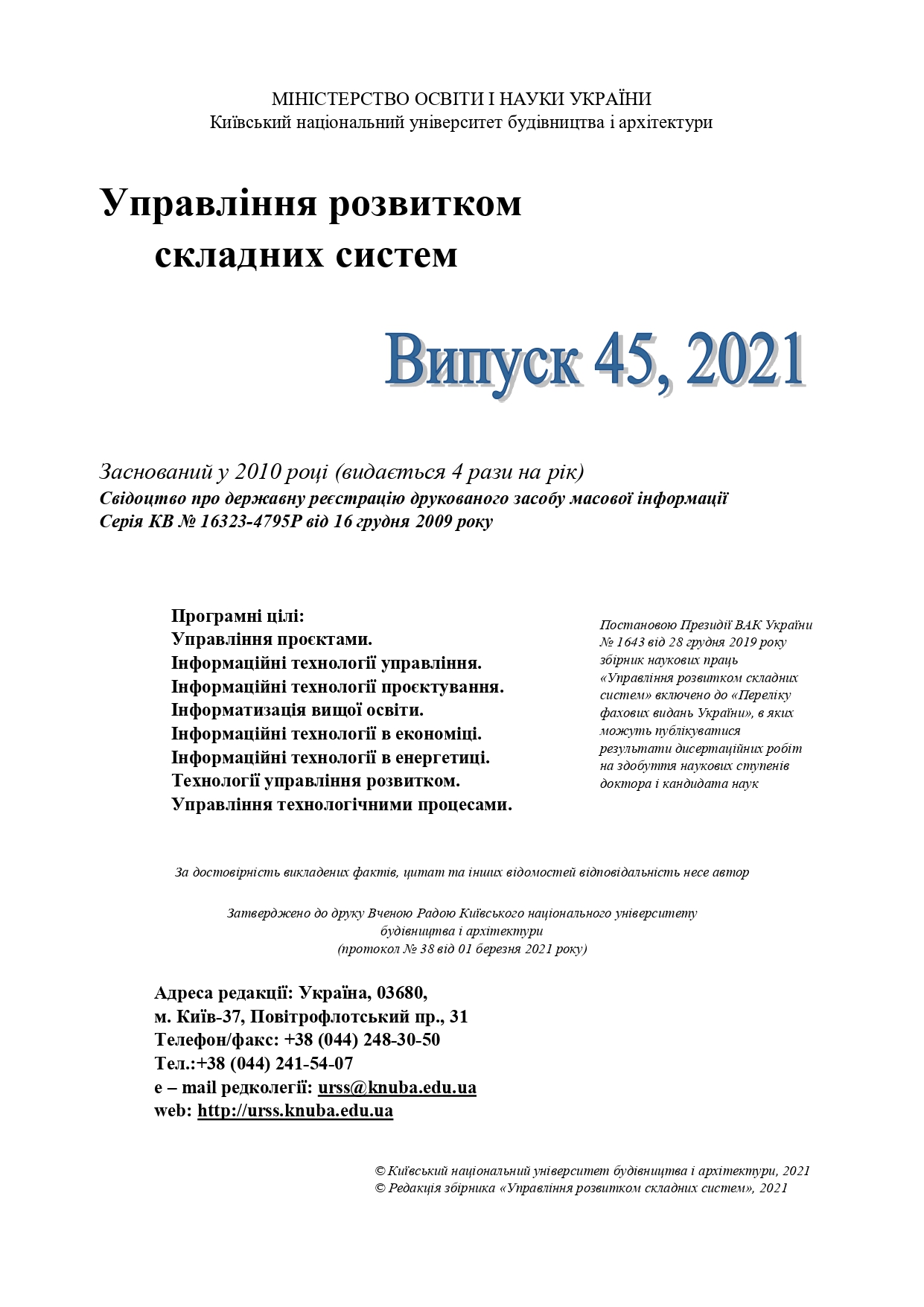USE OF FUZZY PETRI NETWORKS FOR INFORMATION DESCRIPTION OF THE HOUSING ENVIRONMENT
DOI:
https://doi.org/10.32347/2412-9933.2021.45.170-175Ключові слова:
Fuzzy Petri nets, comfort, information model, convenience of housingАнотація
The current state of comfort of an apartment building indicates many problems that exist in this area. First, there is a need for clear planning of comfortable housing, which should take into account the current socio – economic needs of the population. Secondly, there is no clear definition of comfort levels of an apartment building. Also, there is a need to identify the main factors that affect the life and comfort of the population. The article is based on two main areas of research. The first is to present a description of the information model of a hybrid intelligent system (GIS) for the comfort of the living environment of an apartment building. This tool allows you to model the effects of interaction, adaptation, which can be observed in the system when making decisions. The study also simulates complex systems based on the use of fuzzy Petri nets (FPs) to describe comfort. MP and its various types are one of the classes of models that provide an opportunity to present the structure of integrated organizational – information systems and complexes, as well as logical – temporal processes of system operation. Fuzzy Petri nets are divided into two parts. The first part describes the structure of the network, it is usually standard, the processes of initial marking and movement of markers on the network are determined by means and methods of fuzzy sets and fuzzy logic. The biggest area of their application is complex objects. Fuzzy logic is used to formalize fuzzy concepts in terms of semantics and provides efficient information processing along with clear data. With the help of this network the endurance of modeling systems and the optimality of its structure are investigated. To date, a large number of different types of Petri nets are known, which provide an opportunity to present the structure of the models in the absence of analytical representation of the influence of certain factors.
Посилання
Leonenkov, A. V. (2014). Fuzzy modeling in the environment of MATLAB and fuzzyTECH. SPb.: BHV – Petersburg, 736.
Chernyshev, Denys, Kievska, Katerina, Tsiutsiura, Svitlana, Tsiutsiura, Mykola & Gots, Vladislav. (2019). Implementation of technology modeling of information objects at the stages of the life cycle. Management of Development of Complex Systems, 40, 140–146; dx.doi.org10.6084/m9.figshare.11969076.
Zaitsev, D. A. (2004). Invariants of Petri time networks. Cybernetics and system analysis, 2, 92–106.
Sitnik, V. F., Orlenko, N. S. (1998). Simulation: A textbook. К: КНЕУ, 230.
Tsiutsiura, Svitlana, Chernyshev, Denys, & Nykodiuk, Dmytro. (2020). Machine vision improvement method development. Management of development of complex systems, 41, 187–193, dx.doi.org10.32347/2412- 9933.2020.41.187-193.
Kyivska, Kateryna, Tsiutsiura, Svitlana, & Kuleba, Mykola, (2020). Analysis of application of artificial intelligence in BIM-technology. Management of Development of Complex Systems, 43, 97–103, dx.doi.org10.32347/2412- 9933.2020.43.97-103.
Tsyutsyura, M. I., Tsyutsyura, S. V., & Krivoruchko, O. V. (2018). Application of optimal strategies for creating a system of targeted management in education. Management of Development of Complex Systems, 34, 170–174.
Melnyk, G. V. (2000). Influence of architectural and town – planning characteristics of housing of different categories on the level of comfort on its price in Kyiv. Modern problems of architecture and town – planning, 7, 114–118.
Vasilenko, L. V., Litoshenko, G. V. (2001). Prerequisites for the formation of the principles of categorization of housing by level of comfort. Modern problems of architecture and urban planning, 9, 184–189.
Borisov, A. N., Krumberg, O. A., Fedorov, I. P. (1990). Decision making based on fuzzy models. Examples of use. Riga: Zinatne, 184.
##submission.downloads##
Опубліковано
Як цитувати
Номер
Розділ
Ліцензія
Авторське право (c) 2021 Svitlana Tsiutsiura , Andrii Yerukaiev , Nataliia Kostyshynа

Ця робота ліцензується відповідно до Creative Commons Attribution-NonCommercial-NoDerivatives 4.0 International License.

